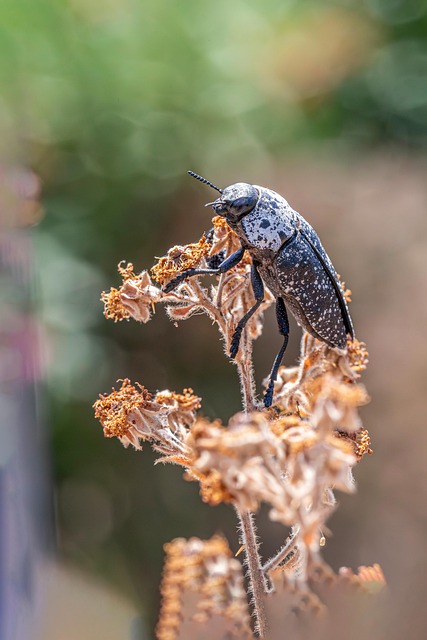Beetle infestations, especially by foreign grain beetles, pose significant challenges in food storage due to their attraction to starchy grains and preference for dark, undisturbed areas. Traditional chemical pesticides are being replaced by eco-friendly alternatives like essential oils (neem, mint), natural predators (ladybugs, lacewings), and aromatic herbs. Integrating these methods through Integrated Pest Management (IPM) ensures comprehensive foreign grain beetle pest control, focusing on prevention, regular inspections, sealing entry points, and biological controls to maintain food security, safety, and quality.
In the realm of food storage, foreign grain beetle infestations pose a significant challenge. These tiny invaders can cause immense damage, spoiling precious food reserves and impacting overall food security. This article delves into innovative techniques for combating these relentless pests. From understanding their behavior to exploring natural and chemical solutions, we present an in-depth guide on effective foreign grain beetle pest control, offering both short-term remedies and long-term strategies for a secure food supply.
Understanding Foreign Grain Beetle Infestations: Their Behavior and Impact
Beetle infestations, particularly those involving foreign grain beetles, pose significant challenges for food storage and preservation. These tiny invaders can quickly transform a seemingly secure pantry into a damaged goods zone. Understanding their behavior is crucial in implementing effective foreign grain beetle pest control measures.
Foreign grain beetles are attracted to stored grains due to their starchy, high-moisture content. They thrive in dark, undisturbed areas, making food storage facilities and warehouses prime targets. Once inside, these pests can lay eggs, and the resulting larvae feed on the grain, causing substantial damage. The impact is not just financial; spoiled food leads to waste, and the presence of beetles can also taint other nearby foods, posing potential health risks.
Traditional vs. Innovative Pest Control Methods
In the battle against foreign grain beetles and other pests, traditional methods have long been the go-to solution. However, with evolving needs and an increasing demand for more sustainable practices, innovative pest control techniques are gaining traction. The shift towards these new methods is not just about effectiveness but also about minimizing environmental impact and ensuring food safety.
Traditional approaches often rely on chemical pesticides, which can leave residues on food and have potential health risks. In contrast, modern innovations such as natural repellents, biological controls, and advanced monitoring systems offer safer alternatives. For instance, using essential oils like neem or mint has proven effective in deterring foreign grain beetles, providing a non-toxic solution. Additionally, introducing beneficial insects that prey on these pests is another eco-friendly strategy gaining popularity. These innovative methods not only protect stored food but also contribute to a more sustainable and environmentally conscious food industry.
Natural and Chemical Solutions for Effective Prevention
In the quest for effective foreign grain beetle pest control, nature offers a plethora of solutions that are both eco-friendly and surprisingly potent. One such method involves introducing natural predators into storage areas. Beneficial insects like ladybugs and lacewings feed on adult beetles and their larvae, helping to keep populations in check. Additionally, certain plants contain natural compounds that act as deterrents. For instance, planting herbs like lavender, mint, or basil around storage zones can repel these pests due to their strong aromas.
Chemical solutions play a complementary role in foreign grain beetle prevention. Permethrin, a synthetic pyrethroid, is widely used and effective against various beetles. It’s important to note that while chemical treatments offer swift results, they should be used cautiously and according to manufacturer guidelines to avoid environmental and health risks. Alternative options include essential oils like neem oil or citrus extracts, which are safer for the environment and can be highly effective when applied correctly.
Long-term Strategies for Stored Food Security
Protecting stored food from beetle infestations requires a multifaceted approach, especially for long-term food security. One effective strategy involves implementing preventive measures to eliminate potential entry points for foreign grain beetle pests. This includes ensuring all storage areas are clean, sealed, and free from debris or materials that could attract beetles. Regular inspections and monitoring are crucial, using traps and pheromone monitors to detect any early signs of infestation.
Additionally, adopting integrated pest management (IPM) practices can significantly enhance stored food security. IPM combines various techniques such as biological control, where natural predators like spider mites or nematodes are introduced to feed on beetle larvae, with the use of insect growth regulators that disrupt beetle development. Combining these methods creates a robust defense against foreign grain beetles, ensuring food quality and safety over extended periods.
Protecting stored food from beetle infestations is a multifaceted challenge that demands innovative solutions, especially with the rise of resilient insect species like the foreign grain beetle. By combining traditional knowledge with modern techniques, such as integrated pest management, natural deterrents, and chemical interventions, we can significantly enhance food security. Long-term strategies, including proper storage practices, regular inspections, and source-to-table monitoring, are essential to safeguard our food supply from these persistent pests. Embracing these diverse approaches ensures a more sustainable and robust defense against foreign grain beetle infestations.
